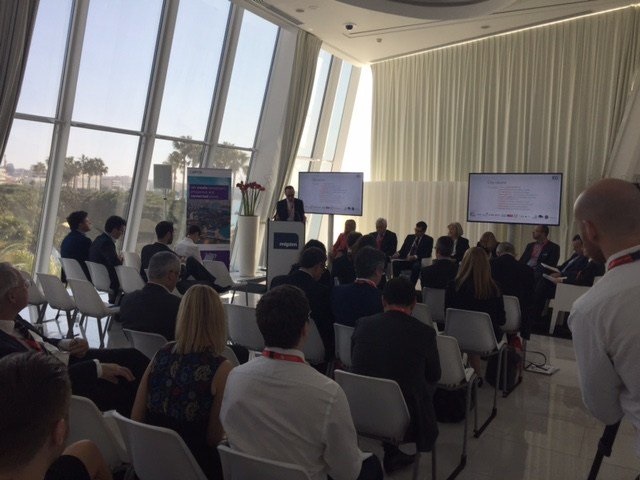MIPIM 2017
Contents |
[edit] Day one
For many, MIPIM (Le marché international des professionnels de l’immobilier) has marked the four most important dates in the calendar. It can set the scene for the year and be the start of many a profitable relationship. It is no stranger to well-rehearsed and very thoughtful conversations. So the question is, after the last 12 months, what is the mood of the real estate industry? Is it downbeat or upbeat? Or is it one of cautious optimism?
If the morning of the first day was anything to go by, the 'mood music' for the UK is very upbeat. Many are leaving the changes of Brexit to one side. They are also not discussing the additional changes imposed on the UK or picking one side or the other. Instead, the picture is changing and there are some very clear messages.
[edit] Competition
The market is more competitive and for investment funding it is becoming increasingly an international market. Significant progress is being made by African and Asian trade blocs in expanding their free trade initiatives (some lessons to learn for the UK perhaps).
The Association of Southeast Asian Nations is now the third-largest trade bloc in the world, increasing globalisation of business ownership and supply chains means organisations need to put more effort into building cross-border relationships with the private sector, trade bodies and governments in other countries, and high-growth emerging markets in particular.
Relationships can serve as both sources of capital and information. Understanding different cultures, new ways of doing business and the opportunities and threats in different regions will help businesses delving into new terrain to work on an international scale.
[edit] Structure
It is important to ensure that the UK creates the right structures – be it regions, the northern powerhouses, city regions or sectors – and they must work together, as the scale of the competition cannot be under-estimated; the scale of some of the new cities in China is mind-blowing.
[edit] Advantage UK
With all that said, global investors still like the UK, as the location (time zone advantage) and history creates a very stable rule of law and the transparency and professionalism of business still maintains. Add to this the current currency devaluation.
[edit] Vision
There is a clear message from MIPIM that for the UK to really drive and to compete there needs to be more ‘clusters’, either from a sector or regional approach.
With such clear vision (cities must be able to articulate their offer) and cohesion, investment and funding will follow. As these clusters evolve, they need to improve their productivity and enable regeneration, which improving the infrastructure which joins them. Within these ecosystems driving up skills also becomes important.
[edit] Day two
One issue which came to the surface when trying to make sense of the conference agenda is the move from real estate as a financial asset, to real estate as a product and more significantly, to real estate as a service. It is a move away from a transactional focus to added value.
In the various conferences and network meetings, the conversation matured from product to service at a building level, as well as focusing on the wider urban level, with urbanisation continuing to be a buzz word for the industry.
Continuing from the thoughts raised by day one, if the UK is to compete in an international market, successful communities and cities need to attract the most diverse number of people to collaborate effectively and share resources, whether that is infrastructure, technology, cultural facilities or ideas.
The UK's buildings, towns and cities need to be living ecosystems that adapt and evolve. This is essential. In the past 10 years there has been significant technology change, but the level of opportunity hasn’t always been met with an industry that is quick to adopt. Perhaps now, the real estate market and MIPIM is maturing rapidly.
However, as the political landscape is becoming more disruptive, it is important not to ignore the disruptive trends, as they will become too important to ignore. In the same vein, one of the long-standing mantra that all in the real estate market stand by is the value in bricks, mortar and location. Should the talk now be of adding to the value of the services, usability, adaptability and service quality of the property?
This results in a perception that returns will flow with little need for active interaction between owner/investor and occupier/user. If this can be done right, this will lead to new business models, new structures with multiple layers of investors and outsourced service providers.
As always MIPIM continues to inspire and provoke interesting conversations and debates. In an exciting and fast-changing world, events like MIPIM are an essential channel for bringing the industry together to review, reflect, regroup and get ready for the next challenge.
The Day 1 article was originally published here, Day 2 here by BRE Buzz. They were written by Martin Townsend.
--BRE Buzz
[edit] Find out more
[edit] Related articles on Designing Buildings Wiki
Featured articles and news
A case study and a warning to would-be developers
Creating four dwellings for people to come home to... after half a century of doing this job, why, oh why, is it so difficult?
Reform of the fire engineering profession
Fire Engineers Advisory Panel: Authoritative Statement, reactions and next steps.
Restoration and renewal of the Palace of Westminster
A complex project of cultural significance from full decant to EMI, opportunities and a potential a way forward.
Apprenticeships and the responsibility we share
Perspectives from the CIOB President as National Apprentice Week comes to a close.
The first line of defence against rain, wind and snow.
Building Safety recap January, 2026
What we missed at the end of last year, and at the start of this...
National Apprenticeship Week 2026, 9-15 Feb
Shining a light on the positive impacts for businesses, their apprentices and the wider economy alike.
Applications and benefits of acoustic flooring
From commercial to retail.
From solid to sprung and ribbed to raised.
Strengthening industry collaboration in Hong Kong
Hong Kong Institute of Construction and The Chartered Institute of Building sign Memorandum of Understanding.
A detailed description from the experts at Cornish Lime.
IHBC planning for growth with corporate plan development
Grow with the Institute by volunteering and CP25 consultation.
Connecting ambition and action for designers and specifiers.
Electrical skills gap deepens as apprenticeship starts fall despite surging demand says ECA.
Built environment bodies deepen joint action on EDI
B.E.Inclusive initiative agree next phase of joint equity, diversity and inclusion (EDI) action plan.
Recognising culture as key to sustainable economic growth
Creative UK Provocation paper: Culture as Growth Infrastructure.
Futurebuild and UK Construction Week London Unite
Creating the UK’s Built Environment Super Event and over 25 other key partnerships.
Welsh and Scottish 2026 elections
Manifestos for the built environment for upcoming same May day elections.
Advancing BIM education with a competency framework
“We don’t need people who can just draw in 3D. We need people who can think in data.”



























